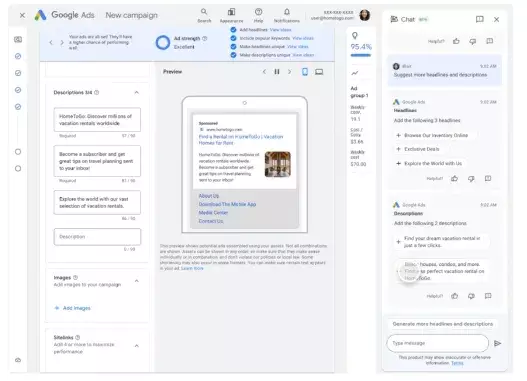In a world increasingly driven by technology, Google continues to assert its dominance in the digital marketing landscape by unveiling groundbreaking AI features aimed at transforming Google Ads. At the recent DMEXCO conference, a premier digital marketing event in Europe, Google provided a detailed overview of these new capabilities, which promise to enhance ad creation, optimization, and performance assessment through AI-driven insights and tools.
The Future of Automated Ad Creation
One of the standout innovations introduced by Google is the expansion of its AI-driven ad building tools, originally launched in English earlier this year. This feature streamlines the ad creation process by allowing users to input their landing page URLs. Google’s AI then crafts descriptive content, proposes targeted keywords, and generates headlines and images tailored to optimize campaign effectiveness. The process, which will soon support German, French, and Spanish languages, marks a significant step toward making sophisticated advertising accessible to a diverse range of businesses. By simplifying the technicalities of crafting effective ad content, Google is not just enhancing user convenience; it is democratizing access to professional-grade marketing tools for businesses of all sizes.
Furthermore, Google has announced the extension of its AI image editing capabilities across a more extensive range of campaign formats. Previously exclusive to Performance Max ads, the advanced customization tools are now available for other advertising categories, including Search, Demand Generation, App, and Display campaigns. This flexibility allows advertisers to tap into powerful image enhancement tools regardless of their campaign type, enhancing visual storytelling across the board. The introduction of allowing multiple reference images will significantly improve the quality and relevance of automatically generated visuals, catering to the creative needs of modern brands seeking engaging content.
Control and Insights to Enhance Campaign Performance
Google’s updates also focus on providing advertisers with more control over AI-generated content. The enhancement of brand guidelines for Performance Max campaigns allows businesses to establish clearer parameters that AI must adhere to, ensuring that generated assets align closely with brand identity. Moreover, the new asset coverage reporting tool presents a more granular approach to analyzing ad performance. Advertisers will receive tailored recommendations, prompting them to make adjustments such as integrating additional long headlines or square images to optimize underperforming asset groups. This level of detail enables marketers to iterate and refine their strategies continually, leading to better performance outcomes over time.
The significance of AI in advertising continues to grow, evolving from a novelty to an essential component of sophisticated marketing strategies. Google’s advancements reveal a shift towards leveraging data-driven insights to tailor advertising efforts more strategically. By integrating omnichannel bidding strategies into Demand Generation campaigns and introducing campaign-level negative keywords in Performance Max, Google is empowering advertisers to optimize their budgets effectively across various platforms and contexts.
While challenges remain—particularly in the area of consistent image generation—Google’s commitment to refining these AI tools speaks to a future where generative AI is no longer just a theoretical concept but a practical asset for advertisers. The promise of substantial improvements in advertising efficacy through AI is not merely aspirational; it’s grounded in the scalability and adaptability of these innovations.
As Google continues to roll out these sophisticated AI features in Google Ads, businesses should consider the implications of such tools for their advertising methodologies. The ability to harness the power of AI to streamline ad creation, optimize image assets, and analyze campaign performance could redefine standards in digital marketing. As the landscape evolves, brands that integrate and adapt to these technological advancements are likely to gain a competitive edge, enhancing their reach and resonance in an increasingly digital world. Ultimately, Google’s commitment to improving and expanding its AI capabilities heralds a new era in advertising that promises to be more responsive, efficient, and impactful.


Leave a Reply